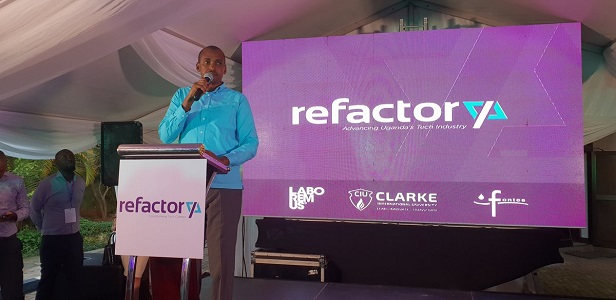Minister of ICT and National Guidance Frank Tumwebaze on Wednesday officially commissioned Refactory, a revolutionary project aimed at churning out people that have ICT skills that will easily land them jobs.
The initiative, which is an idea of Clarke International University; Laboremus, a software development company; and Fontes Foundation, a Uganda-Norwegian NGO, focusing on empowering youth.
Refactory was born out of the glaring statistics that show how Uganda is in a serious need of developers. Local companies like SafeBoda have struggled to get the best people to fill their engineering team, to the extent of setting up an engineering hub in Europe.
If you take a quick look at digital recruitment platforms you will find a ton of companies that have taken months advertising key positions in their software development departments.
“There is no doubt that ICT is the future, and ICT skills are in high demand in Uganda,” Lucrezia Biteete, chairperson Board Fontes Foundation Uganda, said during the launch which took place at Clarke University’s campus in Muyenga, a leafy Kampala suburb.
“At the same, university graduates are frustrated because they don’t find jobs without practical experience or relevant technical skills. In addition to teaching, this programme also offers mentorship, job placements and exposure to future employers, which will hopefully help students kick-start their careers in the tech industry.”
Adding a voice to the need of employable ICT people in the country, Minister Tumwebaze emphasized the need for an education system that focuses on producing people that are ready to create solutions to meet market needs or get a job and earn a living.
“… And my theory now is, if I think we all need to speak with one voice, it should be learning to get skilled and getting skilled to earn, not to only graduate,” he said, adding: “skilling is not about the degree you have.”
How Refactory works
The project, which in 2018 received a 4-year support commitment from the Norwegian Agency for Development Cooperation (NORAD), is structured in three phases.
In the first phase, students undertake what has been termed as a Catalyst Course through which they take lessons in critical thinking, IT project management and an introduction to different technologies.
This runs for three months.
After this, they’ll enroll for a six-month “practical bootcamp” where they’ll be working on solving real problems with partners of Refactory.
In the final phase, the lucky few participate in “Last Mile Program” in which they will have an opportunity to work with an elite ICT company for 6-12 months.
Must read: Uganda’s Ma Role Model is raising money to create a Tinder for mentorship
Here, they earn a salary.
At the launch of Refactory, the first cohort of the Catalyst Program was given certificates. “I am thrilled by the launch of the Refactory Program but most importantly seeing the first cohort complete the Catalyst Program. This is a testimony to what we believe in as a university that you achieve more when we can work together.”
For his part, Timothy Musoke, the chief technology officer at Laboremus Uganda, shared how the program was created.
“When we founded Laboremus Uganda in 2013, one of the key assumptions we built the company on was that there would be thousands of young talented software developers coming out of the universities and that all we had to do was give them a place to use their skills,” he said.
“We were right about the immense talent. Unfortunately, the universities were not doing their job shaping that talent. It took us months to years to train our juniors to reach the level of our European and East African bank clients demand. We are happy to have partnered with Clarke International University and Fontes Foundation to take the lessons we have learnt from years of training developers and scale it up. Ultimately, Refactory allows us to hire job-ready developers.”
Related:
Former minister Nasasira to head national task force on Emerging Technologies
Mara Corporation starts selling Mara X & Mara Z first African-made smartphones

